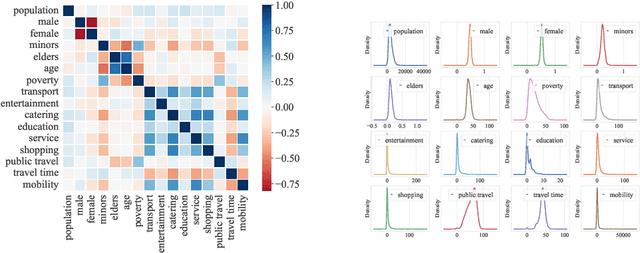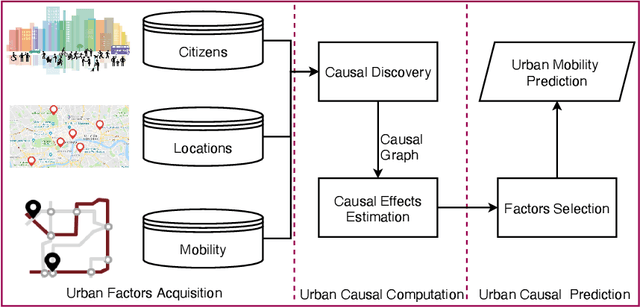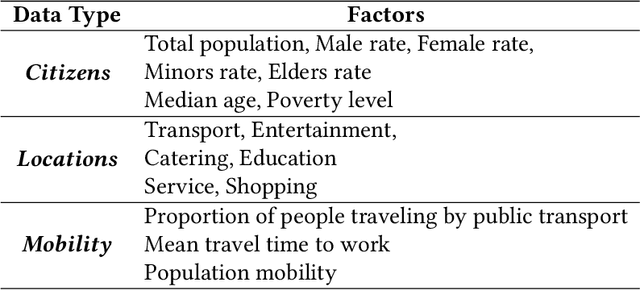Xiaochen Fan
Causal Discovery and Inference towards Urban Elements and Associated Factors
Mar 09, 2025



Abstract:To uncover the city's fundamental functioning mechanisms, it is important to acquire a deep understanding of complicated relationships among citizens, location, and mobility behaviors. Previous research studies have applied direct correlation analysis to investigate such relationships. Nevertheless, due to the ubiquitous confounding effects, empirical correlation analysis may not accurately reflect underlying causal relationships among basic urban elements. In this paper, we propose a novel urban causal computing framework to comprehensively explore causalities and confounding effects among a variety of factors across different types of urban elements. In particular, we design a reinforcement learning algorithm to discover the potential causal graph, which depicts the causal relations between urban factors. The causal graph further serves as the guidance for estimating causal effects between pair-wise urban factors by propensity score matching. After removing the confounding effects from correlations, we leverage significance levels of causal effects in downstream urban mobility prediction tasks. Experimental studies on open-source urban datasets show that the discovered causal graph demonstrates a hierarchical structure, where citizens affect locations, and they both cause changes in urban mobility behaviors. Experimental results in urban mobility prediction tasks further show that the proposed method can effectively reduce confounding effects and enhance performance of urban computing tasks.
EdgeLoc: An Edge-IoT Framework for Robust Indoor Localization Using Capsule Networks
Sep 12, 2020



Abstract:With the unprecedented demand for location-based services in indoor scenarios, wireless indoor localization has become essential for mobile users. While GPS is not available at indoor spaces, WiFi RSS fingerprinting has become popular with its ubiquitous accessibility. However, it is challenging to achieve robust and efficient indoor localization with two major challenges. First, the localization accuracy can be degraded by the random signal fluctuations, which would influence conventional localization algorithms that simply learn handcrafted features from raw fingerprint data. Second, mobile users are sensitive to the localization delay, but conventional indoor localization algorithms are computation-intensive and time-consuming. In this paper, we propose EdgeLoc, an edge-IoT framework for efficient and robust indoor localization using capsule networks. We develop a deep learning model with the CapsNet to efficiently extract hierarchical information from WiFi fingerprint data, thereby significantly improving the localization accuracy. Moreover, we implement an edge-computing prototype system to achieve a nearly real-time localization process, by enabling mobile users with the deep-learning model that has been well-trained by the edge server. We conduct a real-world field experimental study with over 33,600 data points and an extensive synthetic experiment with the open dataset, and the experimental results validate the effectiveness of EdgeLoc. The best trade-off of the EdgeLoc system achieves 98.5% localization accuracy within an average positioning time of only 2.31 ms in the field experiment.
 Add to Chrome
Add to Chrome Add to Firefox
Add to Firefox Add to Edge
Add to Edge